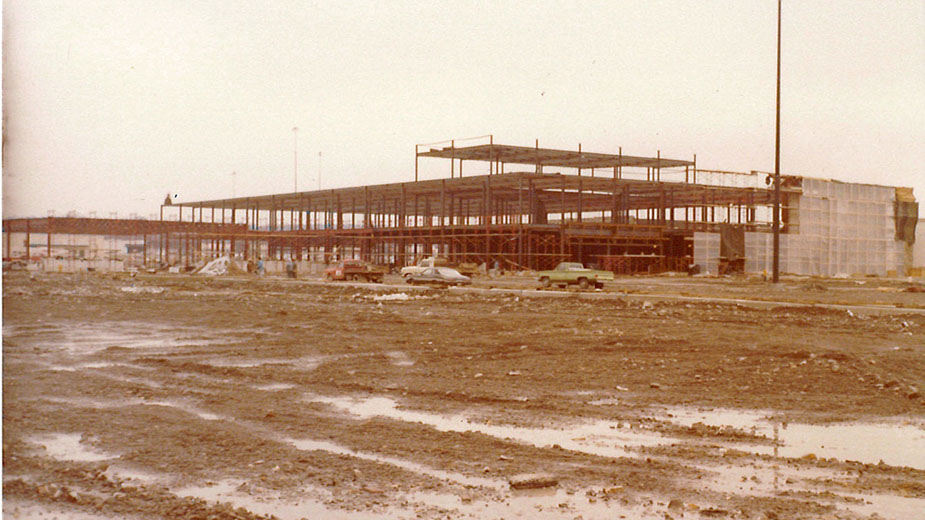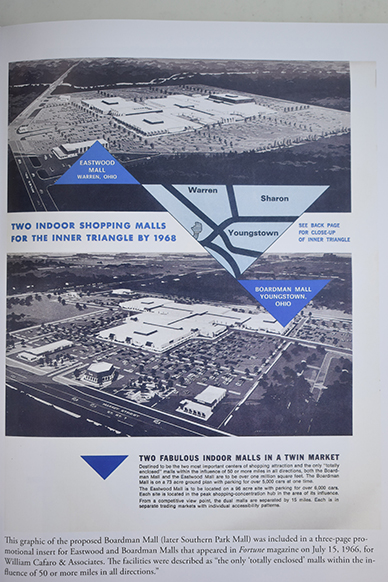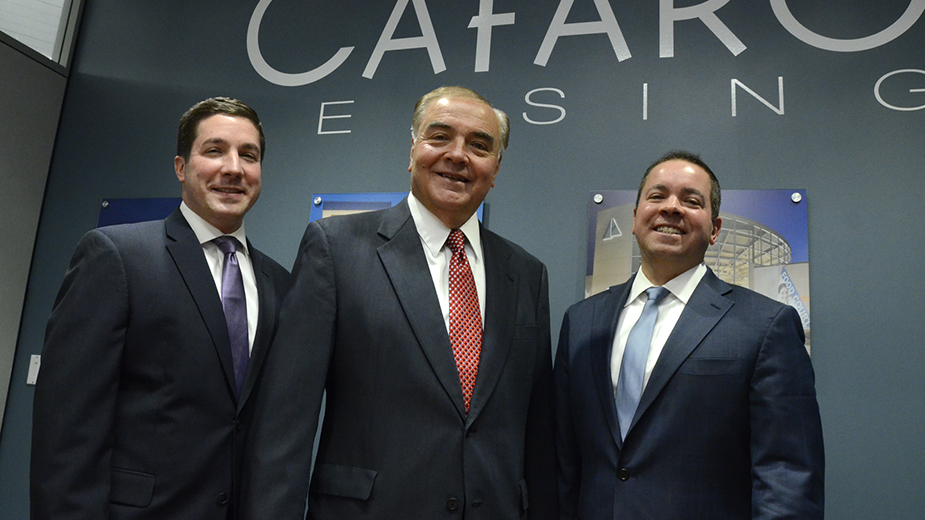(Second in a two-part series.)
NILES – When William Cafaro had an idea, he was determined to see it through. If the founder of the Cafaro Co. was anything, he was persistent, recalls his son, Anthony Cafaro Sr.
“People have to know that when my father started, he was very tight with cash,” Cafaro Sr. says. “He kept going and going and used every penny in his properties for the next project. There were times he was really up against it.”
Perseverance and the loyalty of family, friends and business associates helped to drive the developer’s success, he says.
“He was loyal to his friends,” his son says, among them contractors such as Sam Roth, the former president of heating and ventilation specialists Roth Bros. Inc. (now Sodexo Roth) and Joseph “Blackie” Gennaro, whose paving company became engaged in many of Cafaro’s major projects.
By the early 1960s, the businessman’s successful venture into the retail plaza industry led to new developments in Michigan, Indiana, West Virginia and Ohio.
Between 1960 and 1962 alone, Cafaro developed 17 retail plazas, including the Lincoln Knolls Plaza and the Garland Plaza – both on Youngstown’s East Side – as well as shopping centers in Struthers, Warren and New Castle, Pa.

It wasn’t long before Cafaro’s attention shifted toward the next emerging market trend in commercial retail: the development of enclosed shopping malls.
According to author Thomas Welsh’s “The Life and Legacy of William Cafaro,” a biography edited and published in 2021 by Anthony Cafaro Sr., Cafaro and fellow commercial retail developer Edward J. DeBartolo had proposed constructing an enclosed mall in the heart of Youngstown. Legacy property owners downtown, however, refused to cooperate and the plan went nowhere.
Nevertheless, by 1964, William Cafaro & Associates (it would be renamed The Cafaro Co. by 1974) completed work on brand-new offices along Belmont Avenue in the city and established its new headquarters there. Today, the building serves as the headquarters of Phantom Fireworks.
Cafaro was then forced to explore other markets for its malls – now in suburban areas where the population base was increasing. The company’s first mall, American Mall in Lima, Ohio, would lead to a clash with Cafaro’s sometime partner, DeBartolo.
“Unfortunately, it was a difficult situation,” Cafaro Sr. says. Both developers in 1963 had announced plans to build competing malls just outside Lima, creating tension between the real estate giants since the community’s population would never be able to support two major malls. It was most likely the only occasion where the two developers competed directly. Neither mall is in operation today.

Cafaro pressed ahead with plans to develop new malls, most in medium-size markets. In 1966, his company opened Fort Saginaw Mall in Fort Saginaw, Mich. The following year it opened Kennedy Mall in Dubuque, Iowa, the first climate-controlled mall in the state.
At the same time, plans were moving forward to develop a similar mall in Boardman. “What many don’t realize is that we were co-owner and co-developer of the Southern Park Mall,” Cafaro Sr. says. “My father owned that property.”
Despite initial opposition from the DeBartolo Corp., the two developers worked out an amicable resolution from which both benefited.
It so happened that Cafaro owned the Market Street building in Youngstown’s Uptown district where major retailer Sears was located, Cafaro Sr. says. “My father bought the building so he could control the Sears lease,” he recalls.
Ultimately, he secured a commitment from Sears to serve as an anchor tenant at the mall in Boardman. “We had a commitment from Sears. Mr. DeBartolo had a commitment from JC Penney.” The developers remained friends.
Simultaneously, Cafaro began development of the Eastwood Mall – an $8.5 million enclosed shopping center on the 125-acre former Eastwood Golf Course in Niles.

A three-page promotional insert for William Cafaro and Associates dated July 15, 1966, published in Fortune magazine advertised “Two Fabulous Malls in a Twin Market.” It featured aerial renditions of each. The malls would be “strategically located within its own respective trading area, yet in non-conflicting locations.”
Eventually, Cafaro sold its 35% stake in what became the Southern Park Mall to DeBartolo, while Eastwood Mall and its surrounding development remains the heart of the Cafaro Co. to this day.
Eastwood Mall celebrated its grand opening Sept. 16, 1969. On hand for the ribbon cutting were William Cafaro, his wife, Alyce, and Wendy Dascomb, 1969’s Miss USA. The celebration continued for 10 days, capped off with a fireworks display.
Cafaro Sr. says developing the mall was a challenge. Cost overruns amounted to $5.8 million, and his father placed second – in some cases, third – mortgages on other properties to complete the project, initially a 400,000-square-foot enclosed retail mall. Contractors such as Sam Roth, he recalls, allowed for generous payment terms over a period of time, which enabled the mall to gain its footing and prosper.
“We paid them over five years or so with interest,” Cafaro Sr. says. “They believed in him.”
Beyond the Mall
A critical part of the company’s success over the past 75 years is its ability to forecast changes in the marketplace and adapt quickly, Cafaro says. The company, for example, helped to introduce a number of firsts in the Mahoning Valley and across the country.
“The first mall to have both a Montgomery Ward and a Sears was the Eastwood Mall,” Cafaro recalls. An interfaith chapel at Eastwood, he continues, was the first of its kind in a mall; the first Hills Department Store was located in Cafaro’s Lincoln Knolls Plaza; while one of the first fine dining supper clubs, Cherry’s Top O’ the Mall, operated at Eastwood.
Later, developing nearby parcels surrounding the Eastwood Mall – beginning with the Great East Plaza, for example – proved prescient in building a diverse selection of shopping, dining, entertainment, hospitality, and even sports facilities.
“We want to be everything to everybody,” Cafaro says.
The Cafaro Co., moreover, has remained privately held, an important facet when it comes to decision making and responding to market dynamics. Other developments that are controlled by real estate investment trusts, or REITs, for example, are bound to distribute a percentage of cash to shareholders.
“We’ve spent $20 million to $30 million over the last 10 years here,” Cafaro says. “We keep on building, feeding our properties to make them successful.”
Today, he continues, the mall business is no longer a favorable investment. His father recognized this shift shortly before his death in 1998. William Cafaro died on April 22 of that year, fittingly at his office.
At that time, the company was already exploring new opportunities to diversify. The most glaring departure was the development in 1998 of the $10.5 million Eastwood Field – then Cafaro Field – that has since been the home of the Mahoning Valley Scrappers minor league baseball team, initially the Class A affiliate of the Cleveland Indians.
Since then, the company has relocated its headquarters from Youngstown to the Eastwood Complex, developed a high-end events center, secured three hotel chains, and added two theaters. Today, the entire retail complex boasts more than 3.4 million square feet of space, including 1.4 million square feet of enclosed mall space. More than 200 retailers do business at the Niles site.
“Every time we worked with the Cafaros, we’ve always worked deals that were fair for both parties and we love the facilities that we’re in right now,” says Sam Covelli, whose company, Covelli Enterprises, operates Panera Bread, O’Charley’s and Dairy Queen franchises at the Eastwood complex. “They’ve been very generous to the area and have kept their properties up,” he says. “You feel good to be involved with those properties. All our restaurants there do well.”
Covelli says he’s done business with the Cafaro Co. for more than 35 years, dating to when the restaurateur was the largest McDonald’s franchisee in the country. “He always wanted his tenants to succeed,” he says of Anthony Cafaro Sr.
The Future
Cafaro Sr. steered the company throughout the 1990s and nurtured its growth throughout the following decade, effectively retiring as its president in 2009. Today, his sons William and Anthony Jr. serve as co-presidents of the company at a critical juncture for the retail shopping industry.
“My brother and I started as teenagers, working on the maintenance staff making $3.35 an hour,” recalls Anthony Jr. “Those fountains at the center of the mall – we scraped and painted every one of those.”
The most important lesson for the younger Cafaro, he says, was how these tasks taught him to understand and respect those with different backgrounds and skill sets.
“My early work was learning about life more than shopping centers,” he reflects.
The younger Cafaro – he’ll turn 50 next year – brings experience and a deep breadth of knowledge that exceeds many of his contemporaries across the industry. “Most of them at my age have a 15- to 20-year window of what shopping centers have been,” he says.
Anthony Cafaro Jr., on the other hand, has attended the annual International Council of Shopping Centers in Las Vegas since 1988.
“It used to be during the 1980s and 1990s, if you built a mall, they would come,” he says.
That entire dynamic is upended today because buying habits have shifted toward online shopping and has reduced retail foot traffic. “Hundreds of [malls] have closed across the country over the last few years. And hundreds more will close over the next several years,” he says.
The secret to the Cafaro Co.’s longevity is its agility, Cafaro Jr. says.
“We’ve had to adapt. We haven’t tried to grow like our public peers. Our model is that we build it, stick with it, maintain it and retain its relevancy,” he says.
A more recent example of this transformation is the announcement in April that the first Dave & Buster’s entertainment venue in the Mahoning Valley would locate at the Eastwood Mall in space once occupied by Dillard’s department store.
Other initiatives include development of Enterprise Park, a 103-acre, mixed-use campus that would incorporate commercial, residential, retail, health care and educational components.
“It’s a long-term project at this point,” Cafaro Jr. says. “However long it takes, my family is going to be part of that.”
Multifamily developments, he adds, is a sector that the company is considering as part of Eastwood’s future. “Having apartment-style living, luxury apartments, is something that we’re actively looking at.”
Recently, the Cafaro Co. cut the ribbon for 271-unit apartment towers in Fredericksburg, Va., near the company’s Spotsylvania Towne Centre. “Something like that could be developed here in the future.”
Cafaro Co. today owns and manages properties in 10 states and is one of the largest privately owned shopping center development companies in the United States.
“In our 75th year, it’s much different than what my grandfather was doing at my age,” Cafaro Jr. says.
But the business philosophy and attention to family that was first planted by William M. Cafaro remains a driving force throughout the company, Anthony Cafaro Sr. says.
“He was just as committed to his family as he was to business,” Anthony Cafaro Sr. says of his late father.
“He had no hobbies. Never went on vacation. He wasn’t a woodworker. Two things were important to him: family and business.
RELATED STORY
The Cafaro Co. at 75: Building on Founder’s Visions of the Future
Pictured at top: Anthony Cafaro Jr. and his brother William, co-presidents of the Cafaro Co., flank their father and retired company president Anthony Cafaro Sr.
